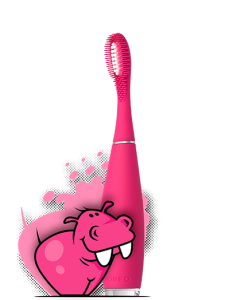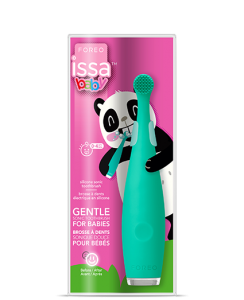There are many kids’ electric toothbrushes on the market in the UK, some with fun features like lighting up, playing sounds or designed with fun characters. But despite the number of products available, some experts recommend sticking to a manual toothbrush until a certain age.
In this article, we will examine the different sides of the ‘electric vs. manual’ debate when it comes to toothbrushes for kids and answer the following questions:
- What is the best kids electric toothbrush for your family?
- Are electric toothbrushes or manual toothbrushes better for your kids?
- What do the experts say about electric toothbrushes for children?
Then, if you decide an electric brush would be beneficial for your baby or child’s oral hygiene, you can continue reading to find out more about the different models and types available in 2024.
What is the best children’s electric toothbrush available in the UK?
Here’s a quick preview of a few of the best kids’ electric toothbrushes this year.
Best Children’s Electric Toothbrushes | ||
Oral-B Stages Power  |
| |
Brush-Baby BabySonic  |
| |
Colgate Minions Toothbrush  |
| |
Brush-Baby electric toothbrushes
Brush-Baby is the only mainstream brand to make electric toothbrushes suitable for children of all ages. The company was established by a British mother who was struggling to find toothbrushes for her children that really ticked all the boxes, so she decided to design her own range.
Brush-Baby electric toothbrushes come in different sizes and styles and are suitable for ages 0+, so you can use an electric toothbrush as soon as your baby has their first tooth if you want to. They have been really carefully thought through, and designed with features that make brushing fun for kids and convenient for parents.
All Brush-Baby electric toothbrushes are powered by an AAA battery, so there’s no need to worry about charging. A two-minute timer helps with the correct brushing time, and a 30-second pacer helps you and your child know when to move to a different part of their mouth.
These brushes also have replaceable heads and are waterproof, so no need to worry if they are accidentally dropped in the bath.
Here’s an overview of Brush-Baby’s electric brushes for children of different ages:
Baby electric toothbrush
The Brush-Baby BabySonic is one of the few baby electric toothbrushes available in the UK, and certainly one of the best.
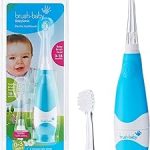
- Suitable for 0-36 months
- Different sized brush heads for 0-18 and 19-36 months
- Super soft bristles and gentle sonic vibrations
- LED light for better visibility inside mouth
- Suction cup on handle to keep it upright when not in use
- Available in teal, blue and pink
- Small, easy-grip handle
“Our toddler can sometimes make toothbrush time a bit of a Battleground. We have been trying to find solutions to help this time of day be a bit less stressful. This toothbrush has helped significantly firstly in the quality of the toothbrushing we are able to achieve but secondly just in the general atmosphere of teeth cleaning because our son sees this toothbrush as something similar to What Mummy and Daddy use and he is very keen to copy”
-N B, Amazon reviewer
Be sure to purchase a genuine Brush-Baby one, because there are others that look almost identical but don’t have exactly the same features.
KidzSonic for ages 3+
For toddlers and older kids, Brush-Baby KidzSonic toothbrushes have fun cartoon characters and flashing disco lights. You can buy different-sized replacement heads for ages 3-6 and 6+, so the brush can grow with your child and last for years to come. The bi-level bristles help to clean deep between teeth.
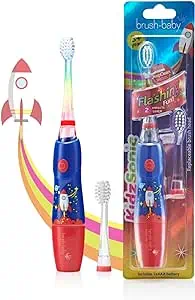
There is a simple on/off button, and with the 30-second pulse timer, your child will learn to cover all areas of their mouth thoroughly as they brush for the recommended two minutes.
“I purchased this product for my grandson, who has just turned 3. He loves his toothbrush and has used it regularly since I gave it to him. The timer helps him to learn how long he should brush and he likes the bright appearance. He is able to tolerate the gentle vibration without any difficulty. Coupled with some nice-tasting toothpaste, he enjoys the routine of cleaning his teeth.”
-Mrs Wilma P, Amazon reviewer
These brushes are available in different colours with a cartoon beaver (pictured), or with a slightly more grown-up rocket and unicorn design.
You can also get the Go-Kids travel electric toothbrush, which has a similar design but comes with a secure cap. This can be good to have on hand for sleepovers and holidays, to make sure the toothbrush stays protected when packed away.
FOREO ISSA range for babies and children
The FOREO ISSA range of toothbrushes includes the FOREO ISSA Kids and the ISSA Baby. Both toothbrushes are electric silicone toothbrushes with incredibly soft bristles which are gentle on teeth and gums.
The FOREO ISSA kids toothbrush is suitable for ages 2 to 12 and is similar to the ISSA Mini. It is a smaller version of the bigger ISSA 2 & 3 toothbrushes and comes in bright poppy colours with cartoon characters on the packaging.
The FOREO ISSA Baby is similar to the ISSA kids, but again a little smaller and it has a round head similar to the Oral-B range of electric toothbrushes.
This ISSA kids toothbrush comes in fun colours that are associated with different cartoon characters including, kiwi green panda, bubble blue dino, sunflower yellow squirrel, strawberry rose lion, and pearl pink bunny.
Some of the features of both these toothbrushes include:
- Material: Medical grade silicone and PBT polymer
- Brush head flexibility: Medium
- Number of intensities: 1
- Battery life: 265 uses on a single USB charge
Oral-B kids’ electric toothbrushes

The Braun Oral-B children’s electric toothbrush range includes both battery-powered and rechargeable models. They mostly feature popular Disney characters from films including Frozen, Cars and Star Wars.
Oral-B Stages Power battery-operated children’s toothbrushes are suitable for ages 3+. Their small round heads provide an oscillating movement to help remove plaque from teeth. The brush is relatively inexpensive but the heads are not replaceable so you’ll have to buy a completely new brush every few months – not great if you’re trying to do your bit for the environment.
Alternatively, you can upgrade to an Oral-B Kids rechargeable toothbrush for kids (pictured). This brush is also suitable for ages 3-5, has replaceable heads, and charges via a mains-powered base, much like their adult range. A full charge lasts about a week. The built-in timer indicates when 2 minutes is up.
All Disney-branded Oral-B children’s toothbrushes can be used with the Disney MagicTimer App which, they say, gets 90% of children brushing for longer. The app gradually reveals an image as kids complete their two minutes of brushing. Over time they collect rewards to fill a virtual sticker album.
For older children 6+
Oral-B has recently developed its range of electric toothbrushes for older children and has a few good options, especially if the child in question is done with childish cartoon characters.
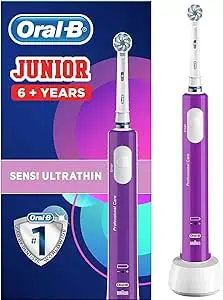
The Oral-B Junior electric toothbrush is suitable for ages 6+ and comes in plain green or purple. It is compatible with the full range of adult toothbrush heads for sensitive teeth, whitening, use with braces, and so on.
The junior brush pulses every 30 seconds to help children spend the right amount of time brushing each quadrant of their mouth. It holds a charge for about 10 days.
They also have a more advanced Junior Smart electric toothbrush with the following features:
- A pressure sensor that alerts when brushing too hard
- A built-in timer
- 3 cleaning modes
- Bluetooth connectivity with real-time brushing feedback on the Oral-B FunZone App
- Battery life of up to 2 weeks
Having these extra features makes it a good electric toothbrush for children who are old enough to brush by themselves but need help ensuring they are brushing with the right pressure and for long enough.
“Like all the other Braun toothbrushes we have this is absolutely excellent. Holds charge well for now. Easy to use and most importantly the child in question is happy using it. We have had this brand for years and they are consistently very reliable and effective.”
-E. Granter, Amazon reviewer
With all of these Oral-B rechargeable brushes for kids, the charging base is the same as for Oral-B adult brushes. This is handy if you have limited space in your bathroom and don’t want several bases out at once.
Colgate

Colgate children’s electric toothbrushes are all battery-operated. The batteries are replaceable but the toothbrush heads are not, and as such they are disposable in nature. The brushes, like Oral-B’s, are plastered with cartoon characters such as Barbie, Spider-Man, Trolls and Minions.
The rotating head is paired with extra bristles for a more thorough clean. One criticism of the Colgate kid’s range in some reviews is that the brush heads are too large.
“Brush head way too big for children, in fact it’s bigger than my adult Sonicare toothbrush. This makes it very hard to brush properly.” said one user.
It’s not the bristles themselves that make the head so chunky, but the depth of the plastic they are embedded in.
Although this is one of the cheapest children’s electric toothbrushes around, it doesn’t present great value for money when you consider it doesn’t even have a timer and it must be thrown away after a few months. However, if you find one with your child’s favourite cartoon characters and it encourages them to brush more, it’s surely worth buying.
Philips Sonicare
Philips has taken a different approach to the kid’s toothbrush market with just one offering: the Philips Sonicare children’s toothbrush. This has Bluetooth connectivity to use with an app, and uses the same sonic cleaning technology as Philips’ adult range.
Philips has cleverly designed the children’s Sonicare to be suitable for different ages with its two speed settings and two brush head sizes. With the slower speed and compact head it can be used from age four, with the faster setting and larger head more suitable for ages seven and up.
In terms of design, you aren’t stuck with gender-stereotyped cartoons; instead kids can choose from a range of sticker designs which affix to the brush handle. These let them personalise their brush and update its look now and again.
The standard brush (without Bluetooth) features a timer which plays a sound every 30 seconds until brushing is complete.
Philips say the battery lasts up to two weeks on a single charge, but many reviewers say it actually lasts longer than this.
Appy brushing
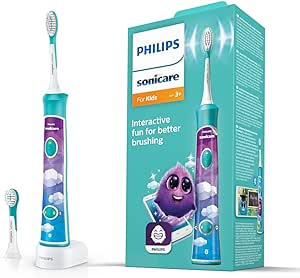
With this smart toothbrush for kids, the brush connects in real-time to the accompanying app to encourage children to brush thoroughly. Led by the character Sparkly, kids will have fun tracking their progress. Some parents have warned that the app is so fun, kids want to keep playing on it even after brushing is over.
Fortunately, the Bluetooth brush can store data from up to 20 brushes without connecting to the app, updating the record next time it is connected. This could be a handy feature if you have a tight morning routine and don’t want the distraction of the app every time your child brushes.
The Philips Sonicare for kids receives great reviews and seems to offer good quality and value for money. If you have children of different ages, this product could avoid the need to buy multiple brushes (as long as they can agree on which sticker to apply!).
Manual vs. electric toothbrushes for children
Entertaining features aside, you no doubt want to know what type of toothbrush is best for cleaning children’s teeth – manual or electric? First, let’s understand the two main types of electric toothbrushes available: battery-powered and rechargeable.
Battery-operated kids’ electric toothbrushes
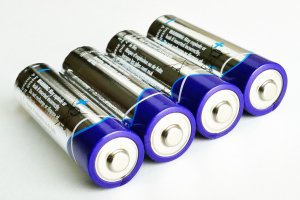
A battery-operated toothbrush takes AA or AAA batteries which must be changed when the old ones run low. The lower the power becomes, the less effective they are at cleaning teeth.
Because these brushes are sold mainly with children in mind, they are usually designed with eye-catching colours and familiar characters.
These are the cheapest type of powered toothbrush and rarely offer the same power as a rechargeable one. However, this can be good for getting kids used to feeling the vibrations in their mouth. Starting them off on a stronger rechargeable model may put them off the idea completely.
The lower cost of a children’s battery toothbrush might be a false economy if you choose a model that doesn’t have replaceable brush heads. Replacing the entire unit every few months will end up costing a lot more in the long run, and also isn’t great for the environment.
If you’re unsure how your child will react to an electric brush, a battery-powered one is a relatively small investment to test the idea out. Many parents, once satisfied that their child will use it properly, may then invest in a more expensive (and effective) rechargeable model.
Rechargeable kids’ electric toothbrushes
Some children’s toothbrushes are powered by the same type of rechargeable battery that’s used in electric toothbrushes for adults. The main difference is that the ones designed for children generally operate at a lower power and have more features to appeal to kids.
Some rechargeable toothbrushes charge via a docking base, which also acts as a toothbrush holder. Others have a USB charger which plugs directly into the brush. The duration of a single charge varies wildly. Some brushes last around a week whereas others hold a charge for up to six months.
Older children may be able to take responsibility for charging their own brush when needed. For younger children, however, it will be the parent’s job to remember this. For some parents, there is a clear benefit to choosing a kids’ rechargeable toothbrush with a long-lasting battery!
Children’s rechargeable toothbrushes tend to have more features than their battery-operated counterparts. This might be a more advanced timer or Bluetooth connectivity, for example.
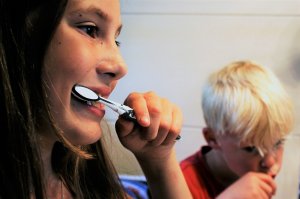
What do the experts say?
The Oral Health Foundation notes that certain features on children’s brushes, including powered ones, can encourage proper brushing. The most important thing, they say, is to choose a brush with soft bristles and a small head that is suited to the age of your child.
An article published in American dental magazine RDH refers to a study which found that children who used a power toothbrush had “significantly longer” average brushing times than those who used a manual one. This is probably thanks to their ease of use, entertaining features, and built-in timers.
Brushing for longer, provided the child reaches every part of their mouth, should result in greater plaque removal. To add to this, increasing numbers of studies are showing that powered brushes are more effective at cleaning teeth than manual brushes. They can also make it easier to clean the hard-to-reach back teeth more thoroughly, a study has shown.
Parents often ask me what kind of toothbrush is best for their children, and whether they should use an electric or manual toothbrush. I always say that the most important thing is to make sure they brush twice a day, for the recommended two full minutes, but the right choice of brush can help encourage good habits.
Children can use an electric toothbrush from age two if they don’t mind the feeling of a power brush. I recommend incorporating an electric toothbrush after age two if your child is able to tolerate it.
Dr. Fatina
On the downside, some experts warn that introducing an infant to an electric brush too early in life means they never develop the motor skills needed to brush manually.
As a parent, you might be concerned about the abrasiveness of a powered brush on your child’s tooth enamel and gums. This is certainly not something to worry about, though. Because it requires less pressure to be exerted for a proper clean, powered brushing can actually be less harmful to soft tissue than manual brushing.
Just be sure to replace the brush head every three months, or earlier if it shows visible signs of wear.
If you are concerned about finding an electric toothbrush for your child that isn’t too abrasive, have a look at silicone toothbrushes like the FOREO ISSA range. Silicone toothbrushes like ISSA Kids, or the ISSA Baby, have extremely soft silicone bristles that are gentle on teeth and gums and are great for sensitive mouths.
You can always speak to your dentist for their children’s toothbrush recommendations – whether manual or electric.
Benefits of electric and manual brushes
The table below summarises the main differences between electric and manual toothbrushes for children. Our guide to manual toothbrushes for babies and kids has more information about choosing the best non-electric toothbrush for your baby or child.
Benefits of electric | Benefits of manual |
It’s worth adding that even if you don’t buy your child an electric toothbrush with a timer, you can find songs and videos online to play while they brush. As long as you choose one that’s two minutes long, it serves the same purpose as a timer. The following video is just an example, but it reminds children how and where to brush as well:
How to brush a child’s teeth properly
Regardless of the type of toothbrush you choose, it’s only as good as the way you or your child use it. Get your child into good brushing habits when they are young and they will hopefully continue them for life, minimising their chances of developing dental caries, gum disease and other oral health problems.
Your child will need help or supervision with tooth brushing until they are seven or eight years old. Start when their first teeth come through and follow these tips to help make sure they’re brushing properly:
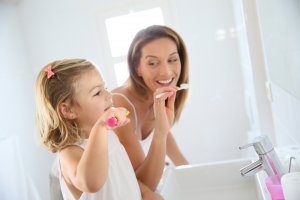
- Children, like adults, should brush for two minutes twice a day – one of those times being just before bed.
- Use a toothpaste that contains fluoride; at least 1,000ppm for children up to age six and 1,350 – 1,500ppm thereafter. Read our children’s toothpaste guide for more about how to choose the best one for your child.
- Use just a rice grain-sized blob of toothpaste until age three and then a pea-sized blob between the ages of three and six.
- Take care to spend time on every surface of each tooth.
- Get your child used to the hand movement of brushing by holding their hand in yours as you help them brush.
- Use a mirror so they can see which parts of their mouth they are reaching.
- Don’t rinse with water after brushing (this washes off the fluoride before it has much effect).
- Replace the brush every three months (or sooner if your child tends to chew on it).
Trouble brushing
If your child won’t concentrate for the full two minutes or it’s a struggle to get a toothbrush in their mouth at all, try to make it more fun for them. You could use an egg timer to time the two minutes, make up a song to sing, or put a poster on the wall next to the basin for them to concentrate on.
However difficult it is to keep your child still for two minutes, don’t let them run or walk around with a toothbrush in their mouth. If they fall, it could cause serious injury to their teeth or mouth.
It’s at this point that the different features of certain kids’ electric toothbrushes might come in handy. One with a timer will tell them how long to brush for, and they may even get the voice of their favourite cartoon character to encourage them. A toothbrush that pairs with a mobile app can also provide added motivation and make brushing fun.
You could also buy some plaque disclosing tablets, which reveal how much plaque is left on the teeth before or after brushing. Plaque revealers can make brushing more meaningful since children see the results of their efforts.
Conclusion
The best toothbrush for your child will depend on your budget and their preferences. You’ll probably find they outgrow each brush after a few years, so they may switch from one to another.
The Brush-Baby electric toothbrush range is suitable for a baby’s first tooth and for many subsequent years. Their brushes have been designed by parents, for parents, but also make sure kids stay entertained.
If you’d prefer to buy from a name you know well, either the battery-powered or rechargeable toothbrush from Oral-B would be a good way to introduce a child to powered brushing from age 3. The rechargeable model with its replaceable heads will work out cheaper (and more eco-friendly) in the long run.
The Philips Sonicare can adapt as your child grows, and the Bluetooth feature offers that bit more engagement than the Oral-B app. But both the brush and the replacement heads are more expensive, so you’d want to be sure your child will make good use of it.
And if you’re looking for an eco-friendly option for your child, you can have a look at our guide to Bamboo electric toothbrushes.
Ultimately, it’s most important that you show your child how to brush correctly and monitor their brushing until they can brush independently – probably around age seven or eight.
There are plenty of other things you can do to keep your child’s teeth and mouth healthy. These include having regular dental checkups and reducing the amount, and more importantly the frequency, of sugar they consume, particularly as snacks.
Oral Health Foundation: Children’s teeth. Consulted 22nd December 2022.
National Library of Medicine: The safety and efficacy of a children’s power toothbrush and a manual toothbrush in 6-11 year-olds. Consulted 22nd December 2022.





